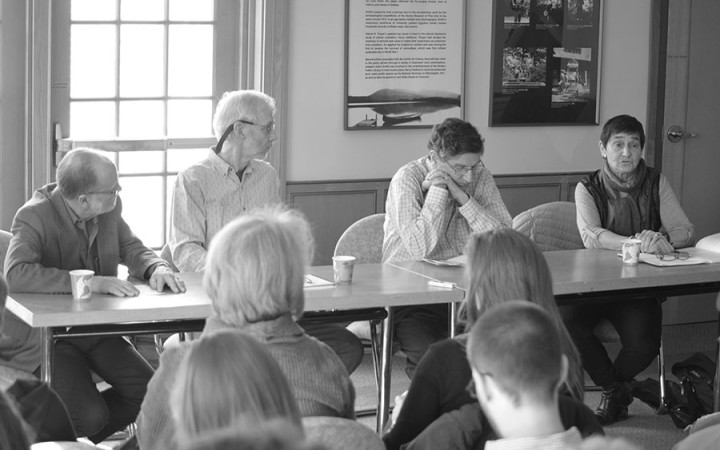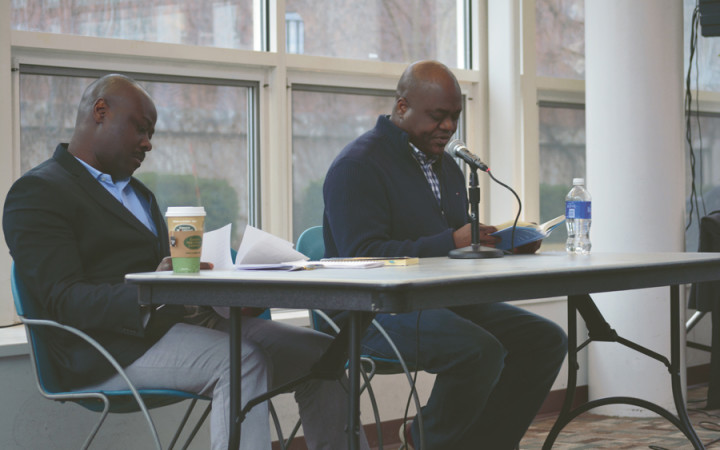Posted on 08 April 2015.
The best way to learn about infectious disease outbreaks and how to control them is to learn from someone who has dealt with the disease first hand.
Elizabeth Talbot, New Hampshire Deputy State Epidemiologist, spoke about her experience working with Ebola on March 21.
Students, faculty and community members gathered in Centennial Hall in the Alumni Center to hear of her work and learn about disease outbreak and control.
Talbot recently returned from Sierra Leone, where she assisted health care workers with their training in working with the Ebola virus.
“I had an unusual primary educational objective that I’ve never had in my teaching before, which is safe work,” Talbot said.
This type of training included protocols to ensure the safety of the health workers when coming into contact with Ebola patients.
“We did this through three days of lectures and simulation with mannequins, and then four to seven days of mentor training within the Ebola treatment center,” she said.
According to the World Health Organization, more than 240 healthcare workers in Guinea, Liberia, Nigeria, and Sierra Leone have contracted the disease.
“It became clear that the way we were going to break the chains of transmission and keep health care workers safe was to establish these Ebola treatment centers,” Talbot said.
These treatment centers were the solution to getting patients out of their communities and into a place where there would be minimal transmission of the disease to others, Talbot said
“The first goal was to create isolation, not to save lives,” Talbot said.
The presentation was this year’s annual Mason library lecture, organized by Celia Rabinowitz, dean of Mason Library.
“When I was trying to think of a speaker in the later part of the summer, a lot of the Ebola epidemic was making the news, and I was looking for a speaker who would draw a broad audience,” Rabinowitz said.
Students attended for a number of reasons, and many had a positive response to the lecture.
Kaley Carr, senior, went to the lecture for her Epidemiology class.
“I think she was very knowledgeable, and personable,” Carr said regarding Talbot.
Carr said that after hearing the lecture, she would no longer make assumptions about diseases and how people get them.
Karlie Marrs, sophomore, attended the lecture as a part of her Microbiology class.
“I’ve definitely wanted to travel to a third world country, and hearing her experience has kind of made me feel better about it and less scared,” Marrs said.
Jessica Dude, sophomore, heard about the lecture from her advisor and attended out of her own personal interest.
“It was really great to see how passionate she was, and how her experience touched her life,” Dude said, “I feel very grateful that I was allowed to come and could hear her, it was very informative.”
As the new Dean of Mason Library, Rabinowitz was very pleased with the response to the first Mason Library Lecture she organized.
“I’m especially happy to see the conversation after the talk, which really tells me that there’s a lot of interest,” she said.
Talbot commented on the importance of learning to control outbreaks of diseases, and the impact that they can have on the human population as a whole.
“I can’t even begin to imagine how this disease epidemic in West Africa would end or would stop being an impact to all of Africa if we did not have national response,” Talbot said.
She continued, “Knowledge is what takes away the fear and allows one to respond.”
Regarding the future of Ebola, Talbot said she believes in one solution.
“The place where I put my hope in the long term for Ebola is a vaccine,” she said, “If these vaccines fail for any reason Ebola will be endemic in society.”
Devon Roberts can be contacted at droberts@kscequinox.com


